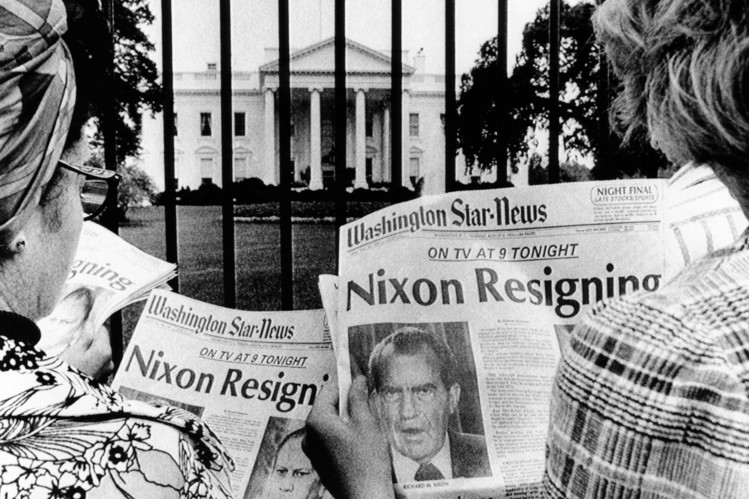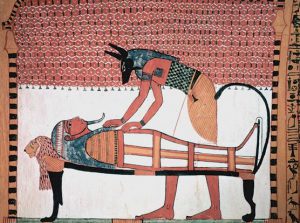Winner of the Fall 2019 StMU History Media Award for
Best Article in the Category of “Political History”
“People have got to know whether or not their President is a crook. Well, I’m not a crook. I’ve earned everything I’ve got.”1 President Richard Nixon at a November 17, 1973 news conference. The state of American politics was at an all time low during Nixon’s second term. He was in a war against his own words and actions everyday, leading up to him resigning from his presidency. On October 20, 1973, the day that has subsequently become known as the “Saturday Night Massacre,” momentum towards the impeachment of Nixon grew rapidly. The Saturday Night Massacre was when President Richard Nixon fired Special Prosecutor Archibald Cox as well as accepting the resignations of Attorney General Elliot Richardson and Deputy Attorney General William Ruckelshaus. Peter Rodino had been Chairman for the House Judiciary Committee for only a few months when his committee began to hear the case for Nixon’s impeachment. On October 23, 1973, resolutions calling for impeachment, impeachment investigations, and appointment of a special prosecutor were introduced against Nixon.2
Peter Rodino went from being a little man, both in reputation and in stature, to being the big boss by working sixteen to eighteen hour work days as soon as the congressional recess ended on January 21, 1974. During this time, Rodino went through extreme mental and physical changes. Due to his time being consumed by the amount of work he was indulging in, he had gained some weight. So in order to lose it, he would skip lunch throughout the week and existed instead on black coffee.3 The committee, as a whole, was not able to function properly, due to their inability to properly retrieve evidence to use against Nixon and figure out how to properly protect it. In February of 1974, Rodino believed he picked up a virus from Florida, leading him to have shortness of breath, become light headed, have chest pains intensify and became tired quicker. He checked up with a doctor after a break on the House floor after becoming alarmed of the symptoms he was experiencing. The doctor sent him to Bethesda Naval Hospital where he was given an electrocardiogram examination and other checks to determine if he had suffered from a heart attack, which he hadn’t, but his doctor did tell him to rest.4

After the Saturday Night Massacre, Rodino began his committee’s investigation. It was not until October 30, 1973, that the House Judiciary Committee began to consider the impeachment process against Nixon. In early January 1974, speculation arose that Nixon was going to resign from the presidency. On February 6, 1974, the process for impeaching Nixon was formally initiated, with the House of Representatives passing a resolution. The resolution gave the Judiciary Committee the authority to investigate whether there was sufficient grounds to impeach Nixon of high crimes and misdemeanors in relation to the Watergate break-in and subsequent cover-up. On April 11, 1974, the Judiciary Committee subpoenaed 42 White House tapes of key conversations. A week later, Leon Jaworski (the Special Prosecutor for the Watergate Case) sent subpoenas for 64 additional recordings.5 Although Nixon wanted to refuse, he eventually ordered transcripts of the tapes to be edited, or removed, so he could send that to Jaworski. The transcripts became public on April 30; however, the tapes and other documents were still withheld from Jaworski. The Judiciary Committee rejected Nixon’s transcripts stating that they did not comply with the terms of the subpoena.6 The Democratic half of the proposed ad hoc committee met behind closed doors, so that after the general staff meeting, Jerry Zeifman (Chief Counsel of the House Judiciary Committee), Larry O’Brien (Chair of Democratic National Committee), and Rodino went to Rodino’s office to draft the statement he expected to issue after the Democrats met. When the three got there, an aide told them the committee had received four hundred telegrams responding to Nixon’s tape offer. They all said to impeach him anyhow.7

Peter Rodino spoke to the House in February 1974 saying, “Whatever the result, whatever we learn or conclude, let us now proceed with such care and decency and thoroughness and honor that the vast majority of American people, and their children after them, will say: ‘That was the right course. There was no other way.'”8 On July 27, 1974, the Judiciary Committee approved the first article of impeachment against Nixon. Two more articles were approved on July 29 and 30. The Articles of Impeachment were over Nixon’s obstruction of justice, abuse of power, and contempt of Congress. Peter Rodino gave a speech during the 1974 voting of Articles for Impeachment saying, “We have deliberated. We have been patient. We have been fair. Now the American people, the House of Representatives and the Constitution and the whole history of our republic demand that we make up our minds.”9
During the House of Judiciary Committee impeachment hearings, the primary focus was Article One of the United States Constitution. The power to impeach was vested directly in the House of Representatives by the second section of the first article of the Constitution. To grant court intervention would be to strike at the very heart of the concept of three co-equal branches of government.10 “Article I, section 3, clause 7 of the Constitution provides that a person removed from office by impeachment and conviction ‘shall nevertheless be liable to Indictment, Trial, Judgment and Punishment, according to the Law.’ But there are no guidelines in the Constitution about a President who has resigned.” Article I charged Nixon with Obstruction of Justice that had a vote of 27 to 11. Article II charged Nixon with Abuse of Power that had a vote of 28-10. And lastly, Article III charged Nixon with Contempt of Congress with a vote of 21-15.11 The other two articles that were being considered, were rejected. They charged Nixon with Ordering the Falsification of records (concerning the secret bombing of Cambodia), 12-26, and Personal Finances and Failure to Pay Taxes, losing by the same margin. Evidence of the tapes surfaced on August 5, when Nixon complied with the U.S. Supreme Court’s ruling requiring him to provide transcripts of the missing tapes. The evidence that the tapes showed was that clearly he implicated himself in a cover-up of the Watergate break-in. August 7, 1974, Senators Goldwater and Scott, and Representative Rhodes met with Nixon in the Oval Office. They spoke to him about his support diminishing in Congress. Goldwater later wrote, “[Nixon] knew beyond any doubt that one way or another his presidency was finished.”12

The president resigned ten days after the Judiciary Committee voted on the three articles, before the full House voted on whether to approve the articles for a Senate trial. On August 8, 1974, Nixon announced that he was resigning from the presidency, labeling himself as the first president in U.S. history to voluntarily resign from office. On August 22, a 528-page report appeared laying out details of what it called the “clear and convincing evidence” against Nixon. Criminal prosecution was a possibility on both the federal and state level against Nixon. However, on September 8, 1974, President Gerald Ford issued a full and unconditional pardon of Nixon. This pardon immunized him from prosecution for any crimes he had “committed or may have committed or taken part in” as president.13 Nixon’s official response to the pardon (September 1974): “Looking back on what is still in my mind a complex and confusing maze of events, decisions, pressures, and personalities, one thing I can see clearly now is that I was wrong in not acting more decisively and more forthrightly in dealing with Watergate, particularly when it reached the stage of judicial proceedings and grew from a political scandal into a national tragedy. No words can describe the depths of my regret and pain at the anguish my mistakes over Watergate have caused the nation and the presidency, a nation I so deeply love and an institution I so greatly respect.”14 However, Nixon proclaimed his innocence until his death in 1994.
- Carroll Kilpatrick, “Nixon Tells Editors, ‘I’m Not A Crook’,” November 18, 1973, The Washington Post, https://www.washingtonpost.com/politics/nixon-tells-editors-im-not-a-crook/2012/06/04/gJQA1RK6IV_story.html. ↵
- Howard Fields, High crimes and Misdemeanor: Was Nixon Guilty? How the Rodino Committee Reached Its Conclusion (New York: Norton, 1978), 6. ↵
- Howard Fields, High crimes and Misdemeanor: Was Nixon Guilty? How the Rodino Committee Reached Its Conclusion (New York: Norton, 1978), 5, 103. ↵
- Howard Fields, High crimes and Misdemeanor: Was Nixon Guilty? How the Rodino Committee Reached Its Conclusion (New York: Norton, 1978), 5, 104. ↵
- Howard Fields, High crimes and Misdemeanor: Was Nixon Guilty? How the Rodino Committee Reached Its Conclusion (New York: Norton, 1978), 193. ↵
- Stanley I. Kutler, The Wars of Watergate: The Last Crisis of Richard Nixon (New York: Knopf, 1990), 323. ↵
- Howard Fields, High crimes and Misdemeanor: Was Nixon Guilty? How the Rodino Committee Reached Its Conclusion (New York: Norton, 1978), 52-53. ↵
- The Washington Post, “Peter Rodino Jr., 95; Led Nixon Impeachment Hearings in ’74,” Los Angeles Times, May 8, 2005, https://www.latimes.com/archives/la-xpm-2005-may-08-me-rodino8-story.html. ↵
- Peter Rodino, “Watergate Figure Peter Rodino Dies” (speech, Washington, DC, July 1974. NPR. https://www.npr.org/templates/story/story.php?storyId=4645365. ↵
- Howard Fields, High crimes and Misdemeanor: Was Nixon Guilty? How the Rodino Committee Reached Its Conclusion (New York: Norton, 1978), 5, 105. ↵
- “Articles of Impeachment,” 1995-2019, Watergate.info,https://watergate.info/impeachment/articles-of-impeachment. ↵
- Bonnie K. Goodman, “OTD in History… July 27, 29 & 30, 1974, the House introduces articles of impeachment against President Richard Nixon,” July 27, 2018, Medium, https://medium.com/@BonnieKGoodman/otd-in-history-july-27-29-30-1974-the-house-introduces-articles-of-impeachment-against-8d638cb266c0. ↵
- Stanley I. Kutler, The Wars of Watergate: The Last Crisis of Richard Nixon (New York: Knopf, 1990), 555. ↵
- “The Statement by Nixon,” September 9, 1974, The New York Times, https://www.nytimes.com/1974/09/09/archives/the-statement-by-nixon-pr.html. ↵



51 comments
Lesley Martinez
This is so interesting because the United States just finished the impeachment process of Donald Trump. These types of events are historical, especially the Watergate Scandal that is still spoken about today. The fact that Richard Nixon resigned ten days after the Judiciary Committee voted on three articles is striking. I was not fully aware of the entire process or how the tapes were handled, but this article does a good job of putting everything in simpler terms. Great article!
Melanie Fraire
I liked the way the article was written, it told the case very well and it was very detailed and informative. I have heard about Nixon and his scandal yet I wasn’t fully aware of the details that were a part of it. I also liked how the article gave us a different view on it and different people involved along the way, it was very helpful and I believed it helped the story a lot.
Berenice Alvarado
I really liked the way that the writer described what was happening behind the scenes. I likes how other people were involved and the way that some background was provided to understand the point of view that these characters have. I would of liked if the article had a little bit more of the protagonist, Nixon. Reading through the article Nixon isn’t really introduced until later in the article.
Antonio Holverstott
The impeachment of Richard Nixon was a little bit more intense than I realized. Not only was he going to be impeached on the coverup of Watergate, but he was also going impeached on falsifying records for the Vietnam War and tax evasion. Also, if he was removed from office, he was going to be confronted for breaking both federal and state laws.
Thiffany Yeupell
Impeachment proves to be a tedious process for all those who are involved, no matter who the central actors are and when the era is. Whether with Nixon from the past or Trump in the present, the Judiciary Committee takes great lengths to conduct the procedures necessary to advance the American narrative involving the President in the House of Representatives. Yet, Nixon resigned while Trump’s case had advanced to the Senate and was not convicted when officially impeached by the House. Nevertheless, both instances faced obstacles when it came to retrieving and presenting evidence, whether internally or externally. Also, I would imagine the precedent of Rodino’s words, ‘of being fair’ has lost some weight in our current times of hyperpolarized politics, compared to back then.
Davis Nickle
This article was very interesting to me because it shed light on Watergate which was an event I was always aware of but never really knew the story of. The whole situation must have been pretty hard to believe at the time, the fact that a president could have been removed from office was something that was always present but never needed. His reassignment must have been shocking to everyone at the time.
Micheal Baladez
This article was incredibly informative to me due to the fact that I didn’t know much about Nixon and the Watergate scandal primarily because of me never really giving a shoot. However, this did bring light to the event that changed the government forever, causing millions of Americans to have distrust in the government officials that they had voted into office. This is also relevant to the time in which I am writing this due to the upcoming impeachment trials faced by our president Donald J. Trump.
Andrea Degollado
I hear about this case in high school but I didn’t know much. The watergate Scandal was a huge deal, it was something that really took a toll on the government and its people. Honestly before this article i didn’t really know much of what happened after Nixon resigned, I think it was strange that president Ford issued a full and unconditional pardon for Nixon considering how much this affected the American people. I also found it interesting that Nixon stuck by his story until the end, that he was innocent.
Juliana Montoya
The Watergate Scandal was something that changed the government forever, mostly because the people in the United States did not trust the government as much anymore. A lot of people knew that Nixon would resign because he was already in the process of being impeached but at that point everyone knew that he was guilty of the crime. I had never really heard of Rodino but the article gave me new information about him.
Cristianna Tovar
Congratulations on your nomination, Thalia! I really enjoyed how you described what went on behind the scenes of Nixon’s impeachment because I think it is an overlooked part of the Watergate Scandal. Before reading your article, I had no idea that Peter Rodino, Chairman of the House Judiciary Committee at the time, had been experiencing serious health problems before he started investigating Nixon’s case. This was a very interesting and informative article; great job!